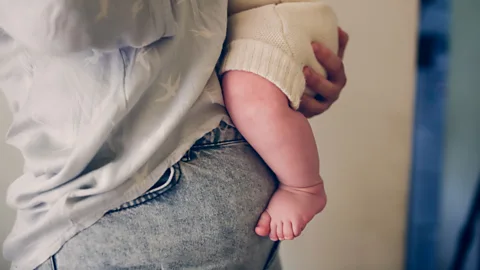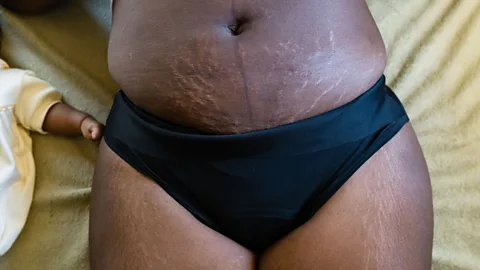Bounce-back culture: Why new mums are expected to 'snap back'
 Getty Images
Getty ImagesAfter having a baby, mums are barraged with the pressure to return to their pre-baby bodies. It’s having an insidious – sometimes dangerous – effect.
Soon after Sharon Oakley gave birth in 2018, acquaintances were quick to congratulate her on her appearance. "Oh, you look really good – you've really bounced back!" she says people told her within months of having her baby.
She may have looked like she'd 'snapped back'. But the reality was different. While she had lost most of the weight she’d put on during pregnancy, physically, she was suffering. An avid runner, Oakley, a Canadian who lives in Yorkshire, UK, loved jogging with her son in the stroller, a routine she took up six months after giving birth. But she'd leak urine the whole way. Back at work, she started experiencing bladder leaks in the office, too.
After a complicated diagnosis journey that included a six-month wait for a physiotherapist referral, Oakley was diagnosed with bladder, rectocele and uterine prolapses – where the pelvic organs, not adequately held in place by a weakened pelvic floor, slip out of their normal position.
Four years later, her condition has improved. But she still has occasional leaks. She carries spare knickers with her everywhere. She worries when she runs. For a while, she thought she might have to quit her job.
"It is a very strange part of our culture where we gauge a woman's postpartum period in of how they look, rather than how they're feeling," says Oakley. "I look fine – but I have these birth injuries that I'm still navigating every day."
Stories like Oakley's are far more common than they are talked about publicly. While not always symptomatic, pelvic organ prolapse alone affects up to 90% of women postpartum. Urinary incontinence, which can also be caused by a too-tight pelvic floor, scar tissue or nerve damage, is experienced by about a third. Diastasis recti, where the abdominal muscles that separate to make room for a growing belly haven't yet knitted back together – something which can make the belly look like it bulges and cause pain, constipation and urine leaks, as well as make walking or lifting difficult – affects 60%.
And even in the absence of specific pregnancy or birth injuries, the drastic physiological changes that happen during pregnancy, labour and postpartum – from the hormones that tell the body to hold onto fat stores, to pressure on the pelvic floor, to the nutrients being siphoned out of the mother's diet to feed a foetus or breastfeeding infant – mean that it takes time to recover and heal.
But many women find that, once the baby is born, the messaging they're getting isn't to rest and recover. It's to 'snap back' into the bodies and behaviours they had before getting pregnant.
In the media, postpartum celebrities' bodies are dissected based on whether they have or haven't lost weight, with little or no knowledge of what other conditions the person might be dealing with. Diet and fitness programmes aimed at mothers abound, relatively few of them led by experts on postpartum health. Friends, family and even colleagues often make comments about a mother's physical appearance. And while 'dad bod' – referring to a man with an 'average' physique – is having a celebratory moment, the people who actually give birth rarely enjoy the same latitude.
For some mothers, the pressure to lose weight quickly, combined with inadequate medical and care postpartum, can be a toxic, even dangerous mix – one that can make birth injuries worse and healing harder. It can also take a toll on both mental and physical health in one of the most vulnerable, sleep-deprived, emotionally turbulent periods of life.
 Getty Images
Getty ImagesInevitable changes
Becoming a mother means more than entering a new life stage. It is a transformation of one's life, mentality, even identity.
For many women, it's likely to be the first time they've been completely responsible for a small, vulnerable human – one who needs them nearly constantly. It also might be the first time they haven't worked or are financially dependent on a partner. Particularly in countries without adequate parental leave or childcare policies, they may be contending with financial stress. And when, or if, they do return to their careers, mums often feel pressure to project an image that motherhood hasn't changed them – often to avoid the ‘motherhood penalty’, in which women see their wages and job prospects suffer. That's even though it’s well known that becoming a parent not only affects people’s priorities (and makes things like, say, late nights at the office more challenging to juggle), but even changes the brain.
All of this is happening, of course, at a time when many women are more exhausted than they've ever been. They're recovering physically from pregnancy and birth. And more than a quarter are experiencing mental health challenges like postnatal depression or birth-related PTSD.
Yet on top of all these omnipresent stressors, mothers are contending with the pressure to 'bounce back'.
Many cultures, especially in the West, put immense pressure on postpartum women to look like pregnancy, birth and motherhood never happened – and quickly.
"Many new birthing parents feel that they have to do a lot to prove that their pregnancy didn’t change them or their bodies at all," says Dr Jennifer Lincoln, an obstetrician-gynaecologist and lactation specialist in Portland, Oregon, US. This is an "unattainable reality for many", she says, yet women still internalise this pressure – and sometimes push their bodies to the brink in dangerous ways.
"I’ve seen people who started up exercising just a week postpartum who then had issues with cervical and uterine prolapse because they went too hard as well as had increased bleeding," says Lincoln, who is also author of the book Let’s Talk About Down There: An OB-GYN Answers All Your Burning Questions… without Making You Feel Embarrassed for Asking. "I’ve also had birthing parents who were breastfeeding but who cut down their calories too drastically and their milk supply tanked."
Even in a healthy, uncomplicated pregnancy and delivery, the body changes a great deal. Many of those physiological changes mean that a return to vigorous exercise or cutting calories needs to be undertaken with caution. Other physical transformations may be here to stay, making bouncing back an impossible goal.
